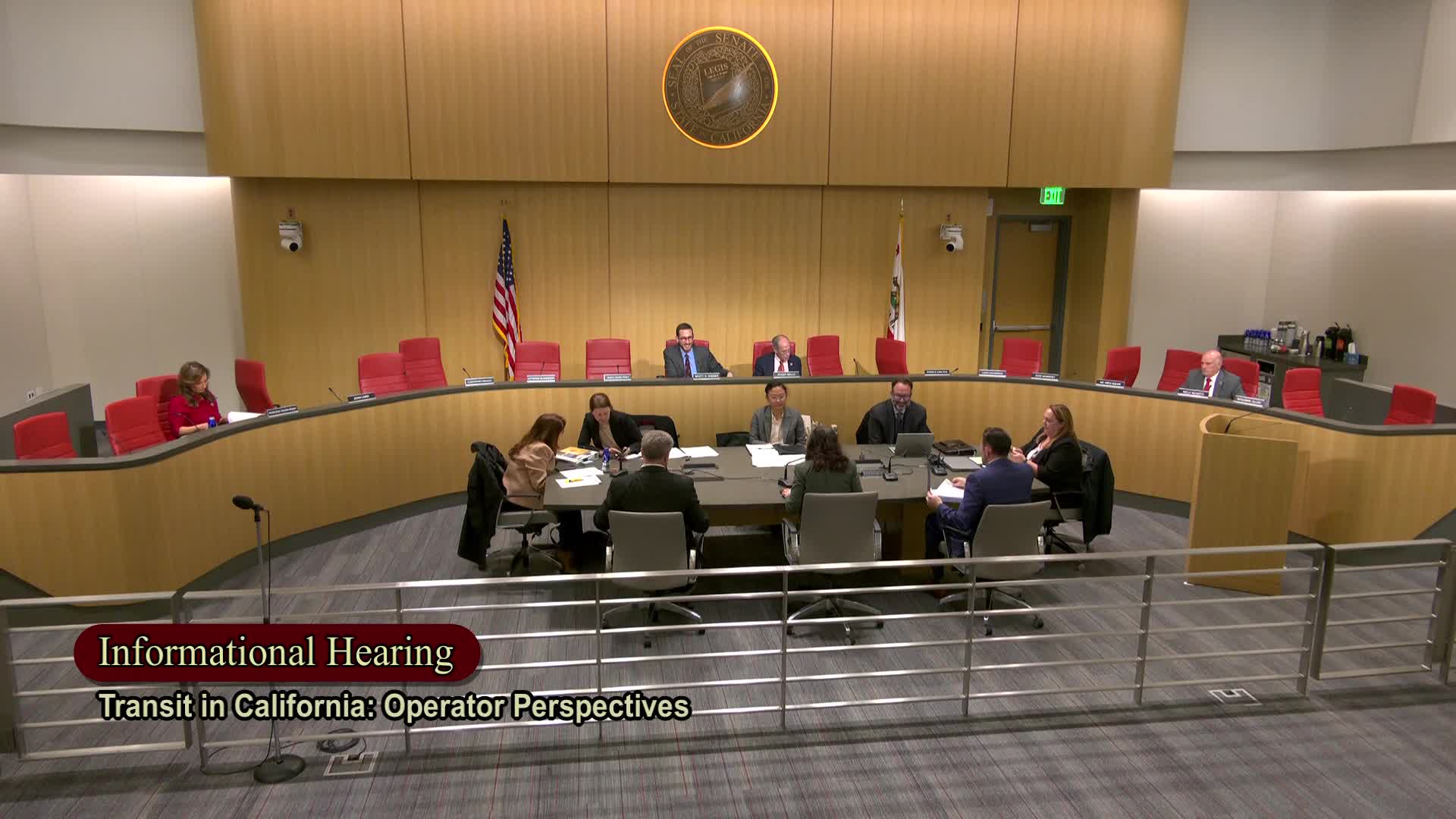Operators warn of looming fiscal cliffs and service cuts; cite safety, fleet and capital obstacles
Get AI-powered insights, summaries, and transcripts
Subscribe
Summary
Representatives from San Francisco Muni, LA Metro and Santa Cruz Metro told senators that SB125 funds staved off near‑term collapse but that expiring relief, reduced fare revenue and transition costs to zero‑emission fleets will bring major deficits unless more predictable funding is found.
Representatives from three major operators described how one‑time federal and state relief helped stabilize service after the pandemic, but warned of significant operating deficits when those funds end.
San Francisco Municipal Transportation Agency: Julie Kirschbaum, acting director of SFMTA, said Muni's weekday ridership recovery was roughly 78% of pre‑pandemic levels overall and over 90% on weekends, but that downtown trips remain low. She gave specific fiscal numbers: she said Muni faces a fiscal cliff she quantified as roughly $322 million starting in the summer of 2026 and that parking revenue at one large garage fell from about $25 million per year historically to a forecast of $9 million this year. Kirschbaum said the agency has cut routes (from 91 to 73), frozen hiring and raised fares and parking fees but still projects a roughly $50 million shortfall in FY 2025–26 without additional funds.
LA Metro: Michael Turner, Metro government relations executive, said LA Metro's ridership has risen to about 90% of 2019 levels overall, with some days (Sundays) exceeding pre‑pandemic counts. Metro is advancing several capital projects (East San Fernando Valley light rail, Foothill Gold Line extension, Southeast Gateway) and pursuing bus electrification, but Turner said conversion costs and capital/operations demands create fiscal pressure. He told senators Metro faced a combined operating and capital shortfall of about $2.3 billion through about 2030 under his agency's planning assumptions.
Santa Cruz Metro: CEO Corey Aldridge described local effects of SB125 allocations. The Santa Cruz County Regional Transportation Commission received $34.6 million from SB125, with roughly $32.3 million allocated to Santa Cruz Metro; the district used roughly $28.3 million over three years for a “Reimagine Metro” service restoration and expansion. Aldridge said the program increased service by 41%, produced an estimated 1.75 million additional passenger trips annually when fully implemented and produced a 22% ridership increase since implementation. Santa Cruz Metro is also implementing a hydrogen fuel cell bus buy (22 buses referenced) and associated fueling/facility upgrades funded through other competitive grants, but Aldridge said the one‑time SB125 allocation will run out in 2026 and the district is considering a half‑cent sales tax measure for 2026.
Other operators and public commenters: BART, Caltrain and other agencies and labor representatives provided public comments or staff testimony noting anticipated deficits: public commenters said BART faces projected annual deficits of $375–400 million starting in fiscal year 2027 and that Caltrain expects roughly $75 million per year shortfalls beginning in the same timeframe. Operator witnesses and labor groups emphasized that publicly funded safety and cleaning investments made during the recovery are vulnerable if agencies must cut staff.
Safety and service quality: witnesses from SFMTA, LA Metro and Santa Cruz described layered approaches to safety — from fare inspectors and transit ambassadors to security contracts and partnerships with local law enforcement — and said investments in cleanliness and safety have helped bring riders back, but that these programs require ongoing funding.
Takeaway: witnesses urged the Legislature to consider predictable, ongoing funding sources to avoid service cuts that would disproportionately harm transit‑dependent riders and undermine climate goals.
